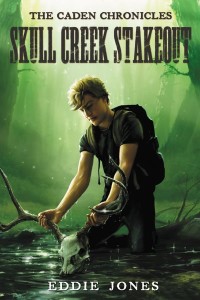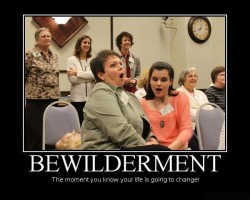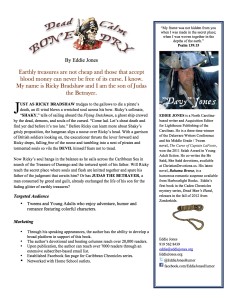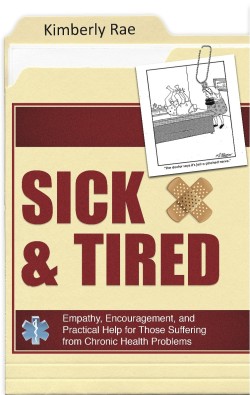Skull Creek Stakeout – Zonderkidz, on sale August 6, 2013 – preorder now!
The Internet, smart phones, online gaming and videos have changed the reading habits of young males. Can we keep books in “their” social network? Yes, says Eddie Jones, award-winning author of Caden Chronicles. Here are seven ways you can turn a reluctant reader into a bookworm.
Boys enjoy books about boys, so pick a story that includes a male lead with a unique skill who is overmatched but becomes the hero through conquering challenges. The book should include a specific goal (treasure), consequences for failure (death of someone or thing) and show the value of moral choice (book’s theme). Boys like action, physical confrontation and really do want to storm the castle and save the princess so books with a reluctant female partner is okay. (Think Hermione and Harry Potter.)
 Turn your boy into a super sleuth
Turn your boy into a super sleuth
Once your son is into the story casually ask him to name the lead character. If he can’t, that’s okay. Suggest he pick a physical feature that will help him remember. If it’s a murder mystery, ask who dies, why and how? This gives you an opportunity to talk with your son about the consequence of violence in a non-threatening way. Create a white board with the names of suspects, possible motives and clues. Adventure and coming-of-age novels lend themselves to different questions but the idea is to get your son talking about the book.
Create a reading hut
Boys of all ages like man caves. Even if space is limited suggest your son create a special reading place. A closet can double as his hide out and a bed sheet draped over chairs makes a great tent. Your aim is to give your son a secret reading spot, a make-believe fort all his own.
Encourage your son to pick a special reading time. Start with a half hour and shoot for a time of day when he is alert. Establish a page limit, a chapter, for example. He may finish early and that’s fine. Encourage him to use the extra time make note of any weapons, motives, and characters introduced in that chapter(s).
Read aloud to your child
Even older kids enjoy it when others read to them. Reading aloud can be a great way to encourage a reluctant reader. Read a chapter aloud, then allow your son to read the same passage silently. Watch for clues to see if he is struggling with words. With a highlighter, mark the word and offer to add it to his special word collection. Later when he sees the word (which you planted for him to find) and correctly identifies it as a secret word, reward him.
Collect bookmarks
Collect cool bookmarks from famous authors and use them as trading cards. Children authors love hearing from kids. This is why we write – to encourage young readers to become bookworms and maybe someday, writers! Visit a children’s author’s web site and request a bookmark. Start today! E-mail eddie@eddiejones.org for a free autographed bookmark.
Form a book club
Encourage your son to create his own book club. Since it’s his club, he can be president. Allow him to pick his favorite books. Suggest he write reviews (with your supervision) on Amazon and BarnesandNoble.com. Help him brainstorm for ways he can add other boys to his book club. Offer to help the “boys only” book club plan a trip as a reward for finishing a book.
Readers are Leaders – Buy a Boy a Book
###
Skull Creek Stakeout – Zonderkidz, on sale August 6, 2013
The good news is, vampires aren’t real. The bad news is…you can’t believe the news.
Nick Caden is a normal fourteen-year-old kid with a “supernatural” knack for finding trouble, ghosts, vampires, and all sorts of undead–or so it seems.
After solving the ghost story murder at Deadwood Canyon, Nick lands a job as a roving reporter for The Cool Ghoul Gazette, a website on paranormal or supernatural disturbances. When the editor sends Nick to investigate a murder in Transylvania, North Carolina, the young super sleuth finds a corpse with fangs, bite marks and a stake driven through the heart. If Nick proves vampires are real, his job as an investigative journalist is set for life! But once he begins to peel back the clues surrounding the mystery of Skull Creek Nick finds his new job is not only scary and dangerous but about to suck the life out of him.
The Skull Creek Stakeout – a story middle-readers and adults can sink their teeth into.
http://www.amazon.com/dp/0310723906/
The Caden Chronicles: Dead Man’s Hand
- 2013 Selah Winner for Young Adult Fiction
- 2013 INSPY Award nominee in the category of Literature for Young People
- 2013 Moonbeam Children’s Book Award nominee
About the Author
Eddie Jones is a North Carolina-based writer and Acquisition Editor for Lighthouse Publishing of the Carolinas. He is a three-time winner of the Delaware Writers Conference and his Young Adult novel, The Curse of Captain LaFoote, won the 2012 Moonbeam Award in the Pre-Teen Fiction/Fantasy category and 2011 Selah Award in Young Adult fiction. Dead Man’s Hand, the first book in the Caden Chronicles mystery series, is now available from Zonderkidz. He co-writes the He Said, She Said devotions, available at ChristianDevotions.us.
Eddie is available to speak to groups and write articles for blogs.
Contact info:
www.eddiejones.org
@ EddieJonesTweet
www.facebook.com/EddieJonesHumor
http://pinterest.com/eddiejones








